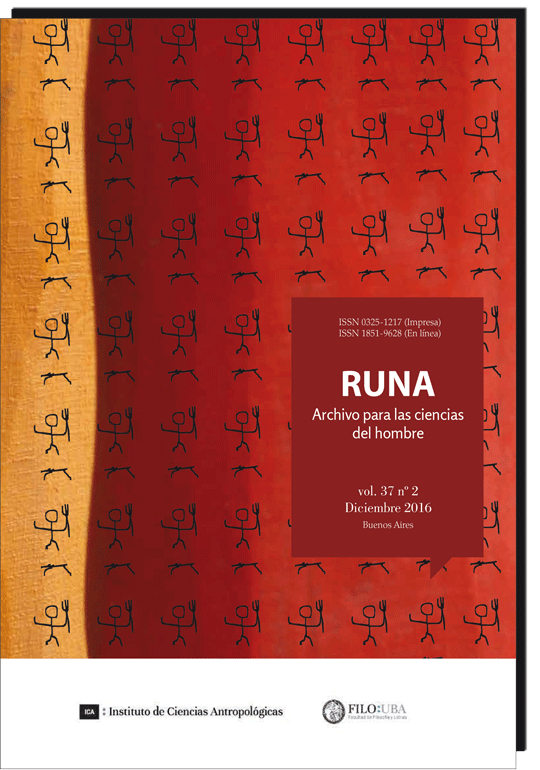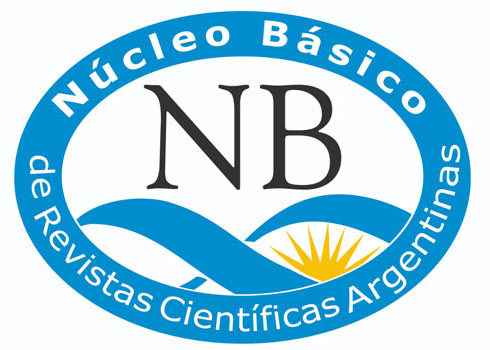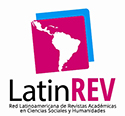Sovereignty, state of exception and killable beings in the theater of operations of the Operativo Independencia (Tucumán, Argentina, 1975-1977)
Abstract
On this paper we analyze the conditions of possibility of the exercise of state violence that both conscripts and residents of the theater of operations underwent during the Operativo Independencia (Tucuman, 1975-1977). We argue that those experiences were marked by the existence of a state of emergency, which allowed the suspension of constitutional guarantees in southern Tucuman and empowered the production of killable beings submitted to the sovereign power of life and death and to the forms of subjugation and abuse established by the military authorities. In this line of analysis, we will raise that the reconstruction of this experience involves two overlapping frames: the bureaucratic logic of compulsory military service (based on the contempt for the lives of the soldiers “under flag”) and the political repression displayed in southern Tucuman, during the Operativo Independencia, characterized for its illegal and clandestine nature.Downloads
References
AGAMBEN, Giorgio. 1998. Homo Sacer I. El poder soberano y la nuda vida. Madrid: Pre-textos.
AGAMBEN, Giorgio. 2000. Homo Sacer III. Lo que queda de Auschwitz. Madrid: Pre-textos.
AGAMBEN, Giorgio. 2001. “Qué es un campo”. En: Medios sin fin. Valencia: Pretextos.
AGAMBEN, Giorgio. 2004. Estado de excepción. Buenos Aires: Adriana Hidalgo Editora.
AGAMBEN, Giorgio. 2007. “El Mesías y el soberano. El problema de la ley en Walter Benjamin”. En: La potencia del pensamiento. Buenos Aires: Adriana Hidalgo Editora.
BENJAMIN, Walter. 1991. Para una crítica de la violencia. Versión electrónica disponible en: www.philosophia.cl/biblioteca/Benjamin/violencia.pdf
BUTLER, Judith. 2006. Vidas precarias. El poder de duelo y la violencia. Buenos Aires: Paidós.
BUTLER, Judith. 2010. Marcos de guerra. Las vidas lloradas. Buenos Aires: Paidós.
CALVEIRO, Pilar. 1998. Poder y desaparición. Buenos Aires: Colihue.
CARNOVALE, Vera. 2011. Los combatientes. Buenos Aires: Siglo XXI.
ESCOLAR, Diego. 2005. “La soberanía en el campo”. En: Wilde, G. y Schamber (eds). Historia, Poder y Discursos. Buenos Aires: Paradigma Indicial SB.
FOUCAULT, Michel. 1998. “Del poder de soberanía al poder sobre la vida. Undécima lección. 17 de marzo de 1976”. En: Genealogía del racismo. Buenos Aires: Editorial Altamira.
FRANCO, Marina. 2012. Un enemigo para la Nación. Orden interno, violencia y “subversión”, 1973-1976. Buenos Aires: Fondo de Cultura Económica.
GARAÑO, Santiago. 2011a. El monte tucumano como “teatro de operaciones” (Tucumán, 1975-1977). Nuevo Mundo Mundos Nuevos, Puesto en línea el 29 septiembre 2011, 17 pp.
GARAÑO, Santiago. 2011b. “Entre héroes y traidores: Sentidos militares y militantes acerca del rol de los conscriptos en los años 70”. Cuadernos de Antropología Social 33: 93-110.
GARAÑO, Santiago. 2012. Entre el cuartel y el monte. Soldados, militantes y militares durante el Operativo Independencia (Tucumán, 1975-1977). Tesis doctoral, FFyL, UBA, mimeo.
ISLA, Alejandro. 1999. “El terror y la producción de sentidos”. Revista de Investigaciones Folklóricas 14: 36-46.
MBEMBE, Achille. 2011. Necropolítica. Madrid: Melusina.
PITA, María Victoria. 2010. Formas de vivir y formas de morir. El activismo contra la violencia policial. Buenos Aires: CELS-Editores del Puerto.
PUCCI, Roberto. 2007. Historia de la destrucción de una provincia. Tucumán 1966. Buenos Aires: Ediciones Del Pago.
SCHMITT, Carl. 1963. Teoría del Guerrillero. Observaciones al Concepto de lo Político. Disponible en línea: http://www.laeditorialvirtual.com.ar.
SLATMAN, Melisa. 2010. “Una doctrina contrarrevolucionaria para el ejército argentino (1957-1976)”. En: García Ferreira, R. (ed.). Guatemala y la Guerra Fría en América Latina. Guatemala: CEUR-USAC.
TAUSSIG, Michael. 2006. “Culture of terror – Space of death”. En: Scheper-Hughes, N. y P. Bourgois (eds). Violence in War and Peace. Singapur: Blackwell.
TISCORNIA, Sofía. 2008. Activismo de los Derechos Humanos y Burocracias estatales. El caso Walter Bulacio. Buenos Aires: CELS-Editores del Puerto.
VILAS, Adel. 1977. Tucumán: el hecho histórico. El plan táctico que posibilitó la victoria contra el Ejército Revolucionario del Pueblo (ERP) en 1975. Mimeo.

Runa, archivos para las ciencias is a publication of the Instituto de Ciencias Antropológicas, Facultad de Filosofía y Letras, Universidad de Buenos Aires and is distributed under a Creative Commons Attribution 4.0 International License.
Runa maintains its commitment to the policies of Open Access to scientific information, considering that both scientific publications and publicly funded research should circulate on the Internet freely, free of charge and without restrictions.
The contents and opinions expressed in published articles are the sole responsibility of their authors.



















